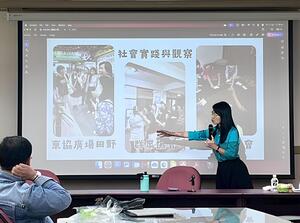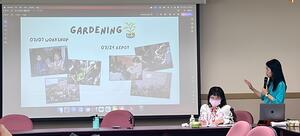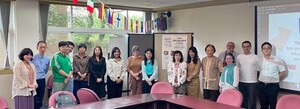Linking Undergraduate Students with Migrants: Three Teaching and Social Practice Experiments



Date :
2025-04-28
Department :
College of Foreign Languages & Literature
【Article by College of Foreign Languages and Literature】
The College of Foreign Languages and Literature (CFLL) at National Chengchi University (NCCU) hosted its roundtable event of the MOE-sponsored project “Cultural Identity from a Global Perspective” on April 11th, by inviting Assistant Professor Tzu-Chi Ou from NCCU’s International College of Innovation to deliver a talk titled “Linking Undergraduate Students with Migrants: Three Teaching and Social Practice Experiments.” Professor Ou shared three cases of her classroom experiments. Through these examples, Professor Ou not only discussed issues of migration and student-migrant engagement, but also delved deeper into how University Social Responsibility (USR) projects can be integrated into both teaching and research in a cyclical and sustainable design—helping students explore and reflect on diverse cultural identities through practical social engagement. The roundtable also featured three CFLL discussants: Assistant Professor Thi-Nham Le (Department of Southeast Asian Languages and Cultures), Associate Professor Ching-An Chang (Department of Arabic Language and Literature), and Associate Professor and Chair Lan-ya Tseng (Department of Turkish Language and Culture). The three discussants responded to Prof Ou’s talk by exploring how universities and educators might confront pressing global migration issues—such as transnational movement and identity—and further deepened students’ understanding of cultural diversity and social responsibility.
The roundtable opened with welcoming remarks and an introduction by Professor Chiung-Ying Yang, Chair of the Department of European Languages and Culture. Professor Ou received her Ph.D. in Anthropology from Columbia University, US and later served as a postdoctoral researcher at the Institute of Ethnology, Academia Sinica, TW. Her areas of expertise include cultural anthropology, urban governance, and migration studies. Regarding teaching, she emphasizes the importance of integrating critical thinking with social practice, incorporating real-world elements through the “Inclusive Innovative USR Project.” This commitment to bridging theory and practice is evident in how she leads students into local communities and encourages them to engage with social realities beyond intellectual abstraction.
Professor Ou’s pedagogical approach centers on “translative collaboration,” where the instructor serves as a translator bridging academic knowledge and societal needs. The evolving goals of USR in each semester inspire constant innovation in course design, resulting in teaching that emphasizes shared values, empathy, and connection with external communities.
The three teaching experiments presented during the roundtable include: “Migrant Placemaking and Walking Tour Design,” “Art Therapy and Healing,” and “Gardening Project – Building an Immigration Garden.” Each course centers around migration experiences and invites students to engage in hands-on fieldwork, sensory exploration, and reflective creation to gain a deeper understanding of the lived realities and cultural differences migrants face.
In the “Migrant Placemaking and Walking Tour Design” course, students visited neighborhoods such as Myanmar Street, Little Indonesia, and ASEAN Plaza in various parts of Taiwan, where they studied migrant cultures on the island and developed walking tour designs to transform learning into shared narratives. In the “Art therapy” course, students explored emotional reactions experienced during social engagement through clay modeling and mixed media art, cultivating empathy and emotional literacy regarding migration. The Gardening Project—inspired by the “immigration garden” of the Kuandu Museum of Fine Arts and the Vietnamese artist Tuan Mami—put emphasis on the integration of gardening and migration courses. By using gardening as a metaphor for migration, identity, and rootedness, the project gave students room to think about issues of identity and migrants. In the project, students were invited to participate in garden building and to understand how culture, language, and mobility intertwine in the search for belonging and home. These courses emphasized not only knowledge acquisition but also emotional resonance, empathetic dialogue, and active participation.
Professor Ou’s teaching exemplifies how education steps outside the classroom to become a site of community interaction and mutual understanding. Through these immersive experiences, students develop a more nuanced view of cultural identity, while contributing to social responsibility initiatives on campus and beyond.
The second half of the forum featured a stimulating discussion among the discussants and the audience. Topics ranged from the practical challenges of experiential courses—such as funding, class management, and the delicate process of building trust with migrant communities—to deeper conversations around cultural identity and hybridity. Questions such as “who is the Other,” “who are we,” and “how do we build bridges across diverse groups,” etc., resonated with the audience, encouraging continued reflection on intercultural cooperation, identity negotiation, and how higher education might better support dialogue in an increasingly mobile and diverse society.
The College of Foreign Languages and Literature (CFLL) at National Chengchi University (NCCU) hosted its roundtable event of the MOE-sponsored project “Cultural Identity from a Global Perspective” on April 11th, by inviting Assistant Professor Tzu-Chi Ou from NCCU’s International College of Innovation to deliver a talk titled “Linking Undergraduate Students with Migrants: Three Teaching and Social Practice Experiments.” Professor Ou shared three cases of her classroom experiments. Through these examples, Professor Ou not only discussed issues of migration and student-migrant engagement, but also delved deeper into how University Social Responsibility (USR) projects can be integrated into both teaching and research in a cyclical and sustainable design—helping students explore and reflect on diverse cultural identities through practical social engagement. The roundtable also featured three CFLL discussants: Assistant Professor Thi-Nham Le (Department of Southeast Asian Languages and Cultures), Associate Professor Ching-An Chang (Department of Arabic Language and Literature), and Associate Professor and Chair Lan-ya Tseng (Department of Turkish Language and Culture). The three discussants responded to Prof Ou’s talk by exploring how universities and educators might confront pressing global migration issues—such as transnational movement and identity—and further deepened students’ understanding of cultural diversity and social responsibility.
The roundtable opened with welcoming remarks and an introduction by Professor Chiung-Ying Yang, Chair of the Department of European Languages and Culture. Professor Ou received her Ph.D. in Anthropology from Columbia University, US and later served as a postdoctoral researcher at the Institute of Ethnology, Academia Sinica, TW. Her areas of expertise include cultural anthropology, urban governance, and migration studies. Regarding teaching, she emphasizes the importance of integrating critical thinking with social practice, incorporating real-world elements through the “Inclusive Innovative USR Project.” This commitment to bridging theory and practice is evident in how she leads students into local communities and encourages them to engage with social realities beyond intellectual abstraction.
Professor Ou’s pedagogical approach centers on “translative collaboration,” where the instructor serves as a translator bridging academic knowledge and societal needs. The evolving goals of USR in each semester inspire constant innovation in course design, resulting in teaching that emphasizes shared values, empathy, and connection with external communities.
The three teaching experiments presented during the roundtable include: “Migrant Placemaking and Walking Tour Design,” “Art Therapy and Healing,” and “Gardening Project – Building an Immigration Garden.” Each course centers around migration experiences and invites students to engage in hands-on fieldwork, sensory exploration, and reflective creation to gain a deeper understanding of the lived realities and cultural differences migrants face.
In the “Migrant Placemaking and Walking Tour Design” course, students visited neighborhoods such as Myanmar Street, Little Indonesia, and ASEAN Plaza in various parts of Taiwan, where they studied migrant cultures on the island and developed walking tour designs to transform learning into shared narratives. In the “Art therapy” course, students explored emotional reactions experienced during social engagement through clay modeling and mixed media art, cultivating empathy and emotional literacy regarding migration. The Gardening Project—inspired by the “immigration garden” of the Kuandu Museum of Fine Arts and the Vietnamese artist Tuan Mami—put emphasis on the integration of gardening and migration courses. By using gardening as a metaphor for migration, identity, and rootedness, the project gave students room to think about issues of identity and migrants. In the project, students were invited to participate in garden building and to understand how culture, language, and mobility intertwine in the search for belonging and home. These courses emphasized not only knowledge acquisition but also emotional resonance, empathetic dialogue, and active participation.
Professor Ou’s teaching exemplifies how education steps outside the classroom to become a site of community interaction and mutual understanding. Through these immersive experiences, students develop a more nuanced view of cultural identity, while contributing to social responsibility initiatives on campus and beyond.
The second half of the forum featured a stimulating discussion among the discussants and the audience. Topics ranged from the practical challenges of experiential courses—such as funding, class management, and the delicate process of building trust with migrant communities—to deeper conversations around cultural identity and hybridity. Questions such as “who is the Other,” “who are we,” and “how do we build bridges across diverse groups,” etc., resonated with the audience, encouraging continued reflection on intercultural cooperation, identity negotiation, and how higher education might better support dialogue in an increasingly mobile and diverse society.


 Fax:886-2-29379611
Fax:886-2-29379611